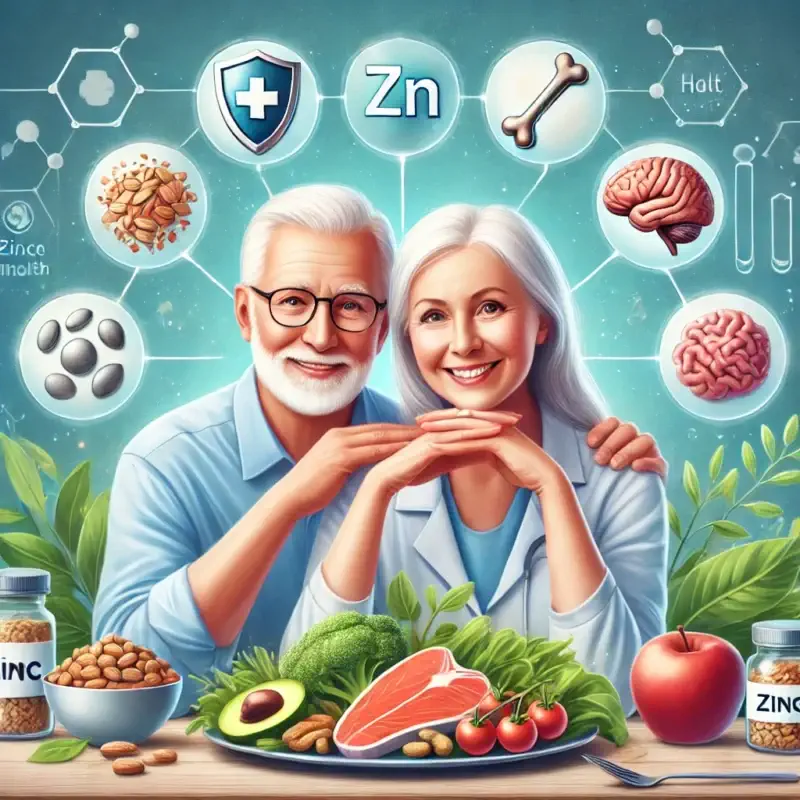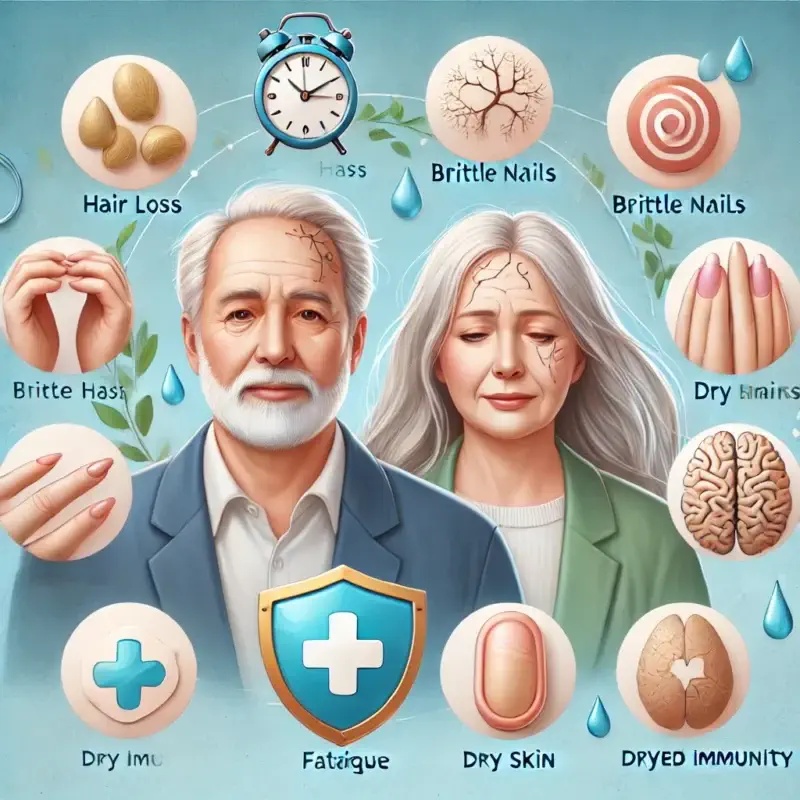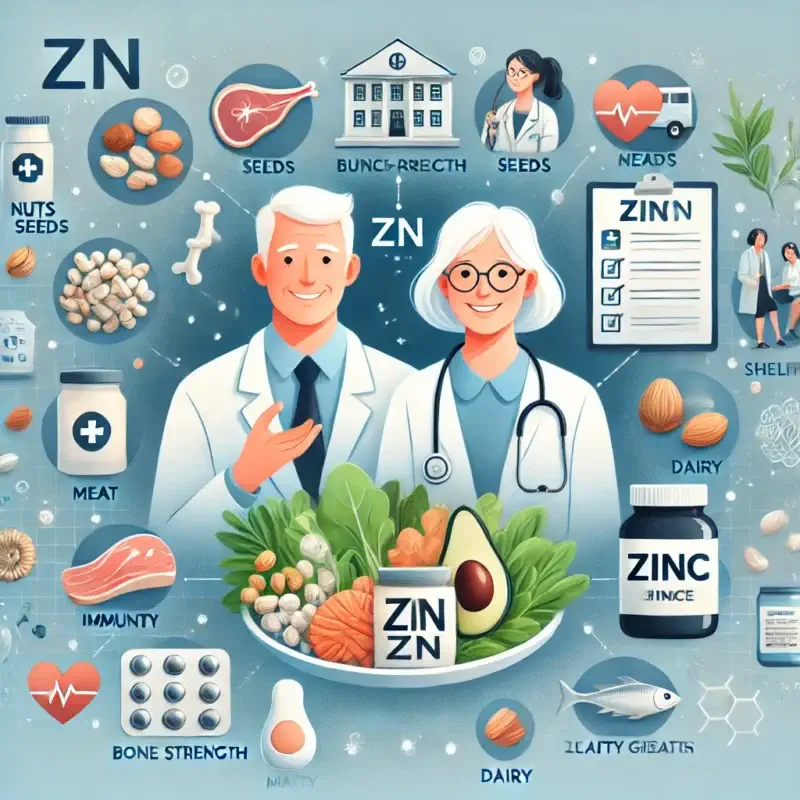
What Are the Benefits of Zinc for the Elderly?
The benefits of zinc for the elderly are undeniable. Zinc is an essential element for the body that plays a key role in maintaining a healthy immune system, healing wounds, maintaining cognitive function, and healthy skin and hair. The importance of zinc, especially for the elderly increases due to the reduced ability to absorb minerals and increased nutritional needs at this age. Zinc deficiency can lead to a weakened immune system, decreased vision, skin problems, delayed wound healing, and an increased risk of infections.
The importance of zinc consumption for the health of middle-aged and elderly people is also prominent in maintaining brain function and preventing diseases such as Alzheimer’s and dementia. Zinc helps strengthen memory and concentration and prevents oxidative stress in brain cells. In addition, this mineral plays a role in the production of collagen, which helps maintain skin health and prevent wrinkles. In the rest of this article from humanhealthmag, we will learn more about how to consume zinc or zinc and its other properties for the elderly.
What is zinc?
Before talking about the benefits of zinc for the elderly, it is better to first get acquainted with this nutrient. Zinc is a mineral required by the body that performs various functions in the human body. This substance is known as one of the most essential minerals required by the human body. This nutrient is one of the most important factors on the list of food requirements for the elderly and elderly people should receive it. In the structure of zinc, there are more than 300 active enzymes, each of which can facilitate various reactions in the body and improve body function.

Zinc is found in most foods and is not difficult to obtain, but in some cases, people may encounter zinc deficiency. In this case, the use of zinc supplements and tablets that can be obtained in pharmacies can compensate for zinc deficiency. Although the human body has a strong need for zinc, its storage location in the body cannot store sufficient amounts of zinc. As a result, humans need to consume zinc almost daily. Otherwise, the zinc in the body will decrease and problems may arise for a person with zinc deficiency.
The Most Important Benefits of Zinc for the Elderly
Is zinc good for the elderly? The benefits of zinc for the elderly are numerous and can affect the body in various areas. Below are some of the most important properties of zinc:
- Immune system strengthening
This substance strengthens the body’s immune system and its deficiency can cause a decrease in immune system function. One of the properties of zinc tablets for people who suffer from many bacterial and viral infectious diseases is that it strengthens their immune system and thus helps prevent many diseases. You should definitely include zinc and its supplements in your vitamins for seniors daily
- Cancer prevention
One of the most important properties of zinc is that this dietary supplement is an antioxidant. Antioxidants are substances that eliminate the effects of free radicals and oxidative stress on the body and, as a result, prevent normal cells from becoming malignant and cancerous. Also, one of the properties of antioxidants is to help reduce blood fat; therefore, zinc supplementation can have a positive effect on people’s blood fat.
- Improving heart health
As mentioned, the antioxidant property of zinc reduces blood fat, which is actually the same as reducing triglycerides and bad cholesterol in the blood. For this reason, it can be effective in preventing fat deposits in the walls of blood vessels and thickening of blood vessels, and as a result, preventing heart attacks. Also, one of the properties of zinc tablets is its effect on reducing blood pressure in many people.
- Preventing vision loss
The most important area in the retina on which people’s vision depends is the macula. In research conducted on these people, completing the course of zinc consumption can prevent problems with the macula. Age-related macular degeneration is a condition in which a person gradually loses their vision due to their age, and consuming zinc can be effective in preventing or reducing this disease.
- Reduces the risk of age-related chronic diseases
Zinc intake through diet and supplementation may reduce the risk of inflammatory diseases. Zinc deficiency due to aging may lead to impaired immune function, systemic inflammation, and chronic diseases.
Diet Review and Zinc Intake From Foods
How important is zinc in our diet? Above we have mentioned the benefits of zinc for the elderly, now we want to know which foods have more zinc. One of the ways to diagnose zinc deficiency is to review the person’s diet. Many elderly people may not get enough zinc due to loss of appetite, digestive problems or following incorrect diets. Usually, doctors ask patients to record their food intake for several days to check whether the body is getting the amount of zinc it needs. Foods rich in zinc include:
- Red meat and poultry (one of the best sources of zinc)
- Fish and seafood (such as oysters and salmon)
- Dairy products (such as yogurt and cheese)
- Nuts and seeds (such as almonds, pumpkin seeds, and walnuts)
- Whole grains and legumes (such as lentils and whole-grain bread)
If a person’s diet shows that their zinc intake is less than 11 mg per day for men and 8 mg per day for women, a doctor may recommend taking zinc supplements.

Ways to Provide Zinc for Middle-aged and Elderly People
There are many ways to get zinc, which we will explain below.
Consuming Foods Rich in Zinc
One of the best and most natural ways to get zinc for middle-aged and elderly people is to consume foods rich in this mineral. The human body is unable to produce zinc, so it must be obtained through the diet. Some foods, such as vegetables, fruits, and processed grains, have very low amounts of zinc. Therefore, it is better for the elderly to have a varied diet and include protein and plant sources of zinc. Proper cooking of food, such as avoiding long-term cooking, helps maintain the amount of zinc in food. Some food sources that help provide zinc include:
- Red meat and poultry: Beef, lamb, chicken, and turkey contain high amounts of zinc. Consuming these foods in sufficient quantities can help prevent zinc deficiency.
- Fish and seafood: Oysters, shrimp, salmon, and sardines are rich sources of zinc. Consuming fish weekly can help provide the body with the zinc it needs.
- Nuts and seeds: Almonds, walnuts, pumpkin seeds, and sunflower seeds are plant sources of zinc that are good options for seniors who eat less meat.
- Whole grains and legumes: Lentils, chickpeas, beans, and whole grain bread can also add significant amounts of zinc to a person’s diet.
- Dairy products: Milk, cheese, and yogurt are sources of zinc that, in addition to providing this mineral, also help with bone health.
Take Zinc Supplements if Necessary
In some cases, zinc intake through diet is not enough, and seniors may need to take zinc supplements. Doctors usually recommend zinc supplements in the following situations:
- People who are malnourished: Elderly people who cannot get enough zinc from food due to digestive problems, loss of appetite or dietary restrictions.
- People with chronic diseases: Some digestive diseases such as Crohn’s disease, ulcerative colitis and kidney disease may reduce zinc absorption.
- Elderly people taking certain medications: Taking certain medications such as diuretics (water pills), antihypertensive drugs and anti-inflammatory drugs may reduce zinc levels in the body.
How to take zinc supplements:
- The recommended amount for elderly men is 11 mg per day and for elderly women is 8 mg per day.
- Zinc supplements are available in tablets, capsules or syrups in pharmacies and should be taken under the supervision of a doctor.
- Excessive zinc intake can lead to side effects such as nausea, diarrhea, and reduced absorption of other minerals such as copper. Therefore, it is essential to follow the appropriate dosage.
Improve Zinc Absorption Through Proper Nutrition
Even if a person consumes enough zinc, their body may not absorb this substance well. To increase zinc absorption, it is essential to follow some nutritional tips:
- Reduce the intake of anti-absorptive substances: Some compounds such as phytates found in grains and legumes can reduce zinc absorption. Soaking and cooking legumes properly can help reduce phytates and increase zinc absorption.
- Increase vitamin C intake: Vitamin C, which is found in citrus fruits, strawberries, and vegetables such as bell peppers, can help improve zinc absorption.
- Reduce alcohol and caffeine intake: Excessive alcohol consumption and caffeinated beverages such as coffee and tea can cause more zinc to be excreted from the body.
- Consume fermented foods: Foods like probiotic yogurt and fermented vegetables help improve zinc absorption.
Concluding Remarks
The benefits of zinc for the elderly is very high due to the vital role of this mineral in body functions. Zinc helps strengthen the immune system, maintain skin health, prevent hair loss, improve cognitive function and maintain bone health. As we age, the body’s ability to absorb minerals decreases, and many elderly people are at risk of zinc deficiency due to decreased appetite, unbalanced diets or chronic diseases.
Zinc deficiency can lead to a weakened immune system, decreased vision, delayed wound healing, hair loss, decreased appetite and even cognitive impairment. Therefore, getting enough zinc is essential to prevent these problems. The benefits of zinc consumption for the health of middle-aged and elderly people requires that this age group meet their body needs through a balanced diet, including red meat, seafood, nuts, legumes and dairy products. Given the key role of zinc in general health, awareness of the daily requirement and ways to meet it helps improve the quality of life of middle-aged and elderly people.
We’re curious to hear your thoughts! What’s your take on this topic? Comment below and join the conversation; your opinion could spark new ideas!

FAQs
What Are Zinc Tablets Good for?
Zinc tablets are useful for strengthening the immune system, improving skin health, supporting muscle growth and strengthening, and improving sexual function.
How Much Zinc is Allowed Per Day?
The daily intake of zinc for adults is about 11 mg and for children between 2 and 8 mg. Consuming more than the allowed amount of zinc may cause problems such as nausea, vomiting, diarrhea, headache, and fatigue. Therefore, it is better to coordinate the use of zinc tablets with a doctor or nutritionist.
What to Eat for zinc Deficiency?
For zinc deficiency, you can use food sources rich in zinc such as red meat, chicken, fish, cereals, legumes, almonds, and pistachios. You can also use food supplements containing zinc.
